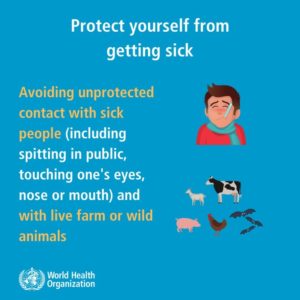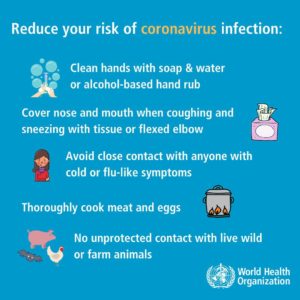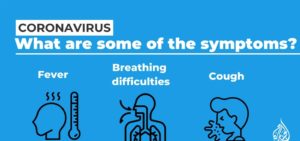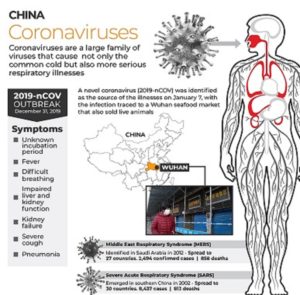
Here are the eight questions employer should ask about coronavirus

What employer should ask about coronavirus. Fundamental question an employer should ask about coronavirus to ensure a safer workplace and the sanctuary of the employees.

The coronavirus outbreak originated in Wuhan, China. It has spread to at least 65 countries and sickened more than 89,000 people, with more than 3,000 deaths, as of March 2. Governments have closed their borders and imposed quarantines, and companies have banned travel. The human and economic impact on businesses has been stark.
This epidemic is the right moment for companies to review the strategies, policies and procedures carefully. They have to put them in place to protect employees, customers and operations for now and future epidemics. Here are eight questions that every employers should ask about coronavirus and respond to, the spread of the virus.

Eight questions that every employer should ask about coronavirus

- How can we protect our employees from the exposure?
The coronavirus that causes COVID-19 has thought to spread mainly through respiratory droplets produced from coughing and sneezing. It seems to spread quickly. It may also be possible to get infected by touching a contaminated surface or object and then touching one’s mouth or nose. The Centers for Disease Control and Prevention advises that employees should:
- Stay at home if they have respiratory symptoms (coughing, sneezing, shortness of breath) or a temperature above 100.4 degrees.
- Leave work if they develop any of these symptoms while at the workplace.
- You should shield coughs and sneezes only with a tissue, elbow or shoulder.
- Wash both your hands often with soap and water for a minimum of 20 seconds or use an alcohol-based hand sanitizer.
Since hand-washing is one of the most powerful defences, employers need to ensure that employees have ready access to washing facilities. And those should be kept well stocked with soap and paper towels. Alcohol-based hand sanitizers and sanitizing wipes should get distributed throughout the workplace. And all frequently touched surfaces, including work stations, countertops and doorknobs should be routinely cleaned.
- When should we exclude employees or visitors from the workplace?
As discussed above, employees should stay home or go home if they have symptoms of coronavirus infection. Managers should not hesitate to send workers who present with COVID-19 symptoms home. Besides, employees or visitors who are symptomatic or at high risk for COVID-19 should be kept separate from the regular staff. They must leave the workplace and obtain medical evaluation while minimizing their public exposure.
Public health organizations suggested that companies bar employees or visitors from coming to the workplace. It is essential for 14 days after a “medium” or “high-risk” exposure to the virus. It helps to avoid staying in close contact with someone who is known to be infected or having travelled from a high-risk region.
- Should we revise our benefits policies?
The number of employees unable to work is increasing. The reason is either because they are sick or because they must care for others. It means that it is the time companies should review their paid time off and sick leave policies. It will give employees confidence that they will not be penalized and can afford to take sick leave. It is an essential tool in encouraging self-reporting and reducing potential exposure.
While few firms outside of Asia have closed their worksites because of the epidemic. About half the Chinese companies had shut down worksites at least temporarily. Such closures will become more common outside of Asia if the epidemic continues on its current course.
- Have we maximised employees’ ability to work remotely?
Many jobs require employees to be physically present. But work including meetings can be done remotely should be encouraged if coming to work or travelling there risks exposure to the virus. For instance, videoconferencing is an excellent alternative to risky face-to-face meetings. Nearly 60% of the employers had increased employees’ flexibility for remote work (46%) or at least plan to (13%).
- Do we own reliable systems for real-time public health communication?
Dangerous rumours and worker fears can spread as quickly as a virus. Companies must reach all workers with regular, internally coordinated, factual updates about infection. You should make them aware of how to control the disease and its symptoms. Be clear with the company policy regarding remote work and circumstances. Let them aware of which employees might be excluded from or allowed to return to the workspace. The emergency response team should vet these communications. And they should be carefully organised to avoid inconsistent policies get communicated by different managers or functions. If you don’t have a current, universal contact capability already, now is an excellent time to create one.
- Should we revive our policies on international and domestic business travel?
Sixty-five per cent of companies are now restricting travel to and from Asia. It is essential to limit employee business travel from areas where COVID-19 is most prevalent. It can prevent both illnesses and avoid loss of productivity due to quarantine or employee exclusion from the workplace after the trip. Companies must track the CDC Travel Health Notices and the State Department Travel Advisories. It can determine what business travel should be cancelled or postponed. The CDC currently recommends that travellers avoid all nonessential trip to China, South Korea, Italy and Iran.
- Should we cancel or postpone scheduled conferences or meeting?
We have already seen scattered reports of cancelled in-person conferences and meetings. And we expect more reports in the upcoming months: 47% of employers are about to cancel planned meeting or conferences to North American employees in selected countries. Local health departments will declare guidance about whether events should be cancelled in a particular area. All conference organizers must provide information on diminishing the chance of infection. And they should assure that proper hand-washing facilities or hand sanitizers are readily available.
- Are supervisors adequately trained?
Sixty-five per cent of companies surveyed that have employees in China are training supervisors about the implications of COVID-19. And 34% of those with employees in North America report they are actively training or planning to train their managers. Whatever form the training takes, managers should have ready access to relevant information. And must know who to contact within the firm to report exposures. Managers or other designated persons in the company should promptly notify local health authorities about any suspected exposure.





